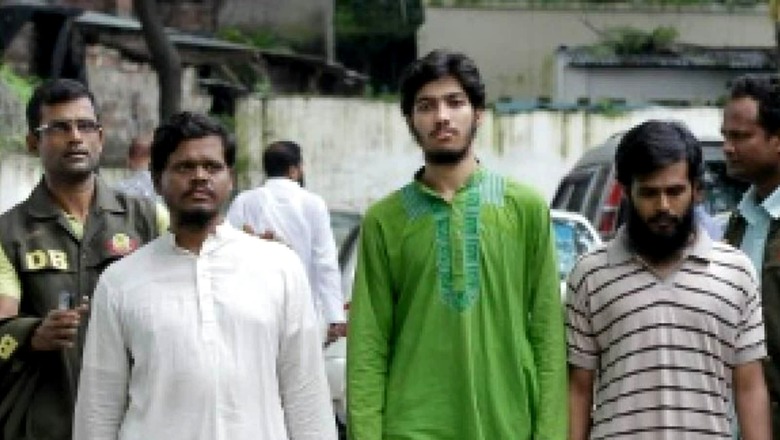
views
Statistics with the United States Department of Homeland Security and the University of Maryland about the Ansarullah Bangla Team (ABT), also known as Ansar al-Islam, have some disturbing details.
The outfit led by radical Islamic preacher Mufti Jashimuddin Rahmani, who is in jail since 2013, has chosen to kill voices opposing the kind of Islam imposed by hardline organisations like ABT itself or others like Jamaat-ul-Mujahideen Bangladesh (JMB), al-Qaeda in Indian Sub-continent (AQIS) Bangladesh (AQIS) and Islamic State (IS).
Considered a front of the AQIS, the terror outfit, banned in Bangladesh in 2015, has killed 20 commoners, seculars, and minorities while seriously injuring another 39, says the data, but the actual fatality toll goes much deeper with the terror group now being capable enough to become active in other countries as well, like India and Singapore. Apart from its physical spread through radicalised preachers, ABT also uses social media as a next-level of propaganda, recruitment, radicalisation, and threat platform. The big catch is, that it is now even recruiting women online.
It uses different social media platforms, with thousands of followers, to identify and target people who are mostly critical of it and vocal on these sites in expressing their opinion and displeasure.
The US database records ABT’s 16 terror activities between 2013 and 2018. The terror group targeted journalists/bloggers in six terror incidents. Ordinary citizens who did not conform to religious lines and activities being imposed by these hardliners were also attacked to set an example. Five such citizens along with their properties were targeted. Police, educational institutions, political parties, and even liberal religious parties have seen regular attacks by the ABT terror group.
These targeted terror attacks, mostly done in public places, were a direct message to the normal Bangladeshis believing in the country’s secular constitution, to secular and liberal people like journalists, teachers, bloggers, and intellectuals, and to minorities to be ready to face similar treatment if they chose to take a different line. For these terrorists, everyone was an atheist and thus a blasphemer, and the only solution was her/his death.
Or in fact, a public assassination.
Bangladesh is a parliamentary republic where religion can’t be in the constitution of any political party. But terror outfits like ABT have just one agenda: to convert Bangladesh into an Islamic Caliphate with Sharia law where extreme and orthodox Islam practised by transnational terror outfits like AQ and IS could be imposed. No question about Prophet Muhammad. No interpretation of Islam against their wishes.
And the worrying aspect is, that they are getting support from across the country, as indicated by their thousands of active online followers. ABT becoming one of the biggest terror groups in Bangladesh in just 15 years with its sleeper cells across the country indicates this. It chose the line of radicalsation to state its training. Its preachers had just one agenda on every street of the country – target normal Bangladeshis, target minorities, allege Islam is under threat, call such people blasphemers, radicalise others to get support, and carry out public assassinations.
ABT terrorists have hacked to death bloggers like Ahmed Rajib Haider, Avijit Roy, Washiqur Rahman, and Anant Bijoy Das in public using sharp-edged melee weapons. Security agencies recovered a list of 12 secular bloggers from Mufti Jashimuddin Rahmani when he was arrested in 2013. The religious leader kept on operating ABT from inside the jail with many bloggers killed after his arrest.
Almost no firearms were used. The database says, in 16 recorded incidents, melee weapons were used 15 times while firearms just 3 times. So, investigation becomes quite difficult particularly when the ABT workers operate in small groups of 4 to 7 members. The veiled message is, “we spread across the society but you can’t trace and catch us and you can’t arrest our growth because we are just a person next door with no weapons”. Their indirect slogan is, “we are loyal to many while hostile to only a few blasphemers”. The result? Most of such voices were either killed, went into hiding, or fled Bangladesh.
This is the imminent threat from terror groups like the ABT that distort religion as they perceive, radicalise the masses, and try to create a parallel network. Bangladesh got its independence from Pakistan in 1971 and vowed to take on religious fundamentalists but took four decades even in starting a trial against them because such groups enjoyed support from a part of the country’s public and its political establishment. Though Bangladeshi, these religious fundamentalists, from Bangladesh Jamaat-e-Islami and other religious parties, opposed the country’s liberation and were part of the Pakistan combat machinery in the 1971 liberation war.
Terror groups like ABT exploit this support base, use religious places and persons and create an illusion of Islam being under threat to create and expand their network. They directly challenge the constitution of the country that says, “The principle of secularism shall be realised by the elimination of communalism in all its forms…the elimination of abuse of religion for political purposes…and any discrimination against, or persecution of, persons practicing a particular religion.”
ABT came out with a second hit list in September 2015. This time, it warned expatriate Bangladeshi bloggers around the world of targeting them. They were in the US, UK, Canada, Sweden, and Germany. The outfit also warned the Bangladesh government to cancel their citizenship. ABT is alleged to have killed another secular writer, Shahjahan Bachchu, on June 11, 2018.
ABT and JMB in fact are believed to be behind the rising number of attacks on minorities in the country, says Bangladesh police as per local media reports. The country, in fact, has seen thousands of attacks in the last 10 years with the Hindu community, 8% of the nation’s population, being singled out. Their temples, their religious processions like Durga Puja, their properties: everything has been targeted. Data from Ain o Salish Kendra, a legal aid and human rights organisation in Bangladesh, says the Hindu community saw 3,679 attacks between January 2013 and September 2021.
The US Department of State, in fact, goes on to say in its 2021 Report on International Religious Freedom, quoting Freedom House: “Recent violent incidents were part of a pattern in recent years in which violence against religious or other minorities appears to have been deliberately provoked through social media”.
Read all the Latest News India and Breaking News here




















Comments
0 comment